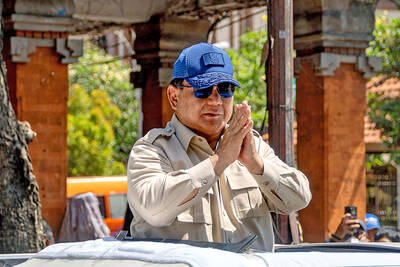Health researchers said on Thursday they had found a troubling link between higher consumption of rice and Type 2 diabetes, a disease that in some countries is becoming an epidemic.
Although further work is needed to probe the apparent association, diets that are high in sugar and fats should remain on the no-go list, they cautioned.
“What we have found is white rice is likely to increase the risk of Type 2 diabetes, especially at high consumption levels such as in Asian populations,” Qi Sun (孫齊) of the Harvard School of Public Health said.
“At the same time, people should pay close attention to the other things they eat. It is very important to address not just a single food, but the whole pattern of consumption,” he added
In the British Medical Journal, Sun’s team said the link emerged from an analysis of four previously published studies, carried out in China, Japan, Australia and the US.
Those studies followed 350,000 people over a period of four to 22 years. More than 13,000 developed Type 2 diabetes.
In the studies carried out in China and Japan, those who ate most rice were 55 percent likelier to develop the disease than those who ate least. In the US and Australia, where consumption of rice is far lower, the difference was 12 percent.
Participants in the two Asian countries ate three or four servings of rice a day on average, compared to just one or two servings a week in the Western countries.
White rice is the No. 1 form of rice eaten in the world. Machines produce its polished look by hulling and milling, leaving a grain that is predominantly starch.
Brown rice, by contrast, has more fiber, magnesium and vitamins, and a lower “glycaemic index,” a measurement of sugar content, than white rice.
Sun said the study did have limitations, including full details about what the volunteers ate in addition to rice.
“I do not think I can put forward a 100 percent confirmed case, given that this is a meta-analysis of four original studies,” he said. “But I see a consistency across these studies and there is biological plausibility that supports the association between white rice consumption and diabetes.”
“More trial data are needed to corroborate or refute our observations,” he added.
Diabetes affects about 350 million adults worldwide, according to the US Centers for Disease Control and Prevention.
Diet is only one factor in Type 2 diabetes, a complex disease that involves high levels of blood sugar that cannot be processed by the hormone insulin. Obesity and lack of exercise are also cited as culprits.

DEADLOCK: Putin has vowed to continue fighting unless Ukraine cedes more land, while talks have been paused with no immediate results expected, the Kremlin said Russia on Friday said that peace talks with Kyiv were on “pause” as Ukrainian President Volodymyr Zelenskiy warned that Russian President Vladimir Putin still wanted to capture the whole of Ukraine. Meanwhile, US President Donald Trump said that he was running out of patience with Putin, and the NATO alliance said it would bolster its eastern front after Russian drones were shot down in Polish airspace this week. The latest blow to faltering diplomacy came as Russia’s army staged major military drills with its key ally Belarus. Despite Trump forcing the warring sides to hold direct talks and hosting Putin in Alaska, there

North Korea has executed people for watching or distributing foreign television shows, including popular South Korean dramas, as part of an intensifying crackdown on personal freedoms, a UN human rights report said on Friday. Surveillance has grown more pervasive since 2014 with the help of new technologies, while punishments have become harsher — including the introduction of the death penalty for offences such as sharing foreign TV dramas, the report said. The curbs make North Korea the most restrictive country in the world, said the 14-page UN report, which was based on interviews with more than 300 witnesses and victims who had

COMFORT WOMEN CLASH: Japan has strongly rejected South Korean court rulings ordering the government to provide reparations to Korean victims of sexual slavery The Japanese government yesterday defended its stance on wartime sexual slavery and described South Korean court rulings ordering Japanese compensation as violations of international law, after UN investigators criticized Tokyo for failing to ensure truth-finding and reparations for the victims. In its own response to UN human rights rapporteurs, South Korea called on Japan to “squarely face up to our painful history” and cited how Tokyo’s refusal to comply with court orders have denied the victims payment. The statements underscored how the two Asian US allies still hold key differences on the issue, even as they pause their on-and-off disputes over historical

CONSOLIDATION: The Indonesian president has used the moment to replace figures from former president Jokowi’s tenure with loyal allies In removing Indonesia’s finance minister and U-turning on protester demands, the leader of Southeast Asia’s biggest economy is scrambling to restore public trust while seizing a chance to install loyalists after deadly riots last month, experts say. Demonstrations that were sparked by low wages, unemployment and anger over lawmakers’ lavish perks grew after footage spread of a paramilitary police vehicle running over a delivery motorcycle driver. The ensuing riots, which rights groups say left at least 10 dead and hundreds detained, were the biggest of Indonesian President Prabowo Subianto’s term, and the ex-general is now calling on the public to restore their